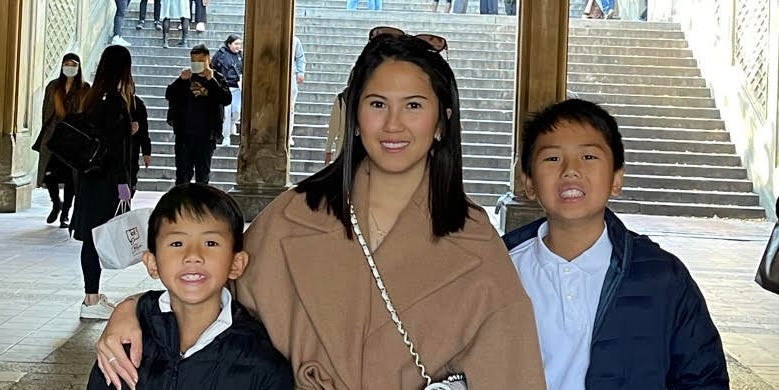- Jeanne Pastrano quit her $200,000-a-year job in New York after feeling burned out.
- After a six-month break, she said she felt rejuvenated and was ready to get back to work.
- She disclosed the sabbatical on her LinkedIn profile — and found she still got a new job easily.
This as-told-to essay is based on a conversation with Jeanne Pastrano, a 37-year-old mom based in New Jersey. Pastrano quit her job in April after feeling burned out. This story has been edited for length and clarity. Business Insider has reviewed compensation documentation for her previous job and her current job as a strategic account manager at Sardine.
People would always tell me, “You make being a working mom look so easy.” Maybe I did — but that doesn’t mean it was easy.
I’m 37. I have two boys, ages 10 and 12, and I was an account manager at Adyen, a financial technology company, up until April. I liked my job and made around $200,000. We lived in New Jersey, and I worked in New York.
As a working mom, you put up a face of strength because if you don’t, a lot of things will fall apart. The only way to keep it together is to be very organized and stay on top of things all the time — and that is what I did. It doesn’t mean at the end of the day, you’re not exhausted.
I felt like I was stretching myself too thin. When I was at home, I was thinking about work. When I was at work, I was also thinking of a million things I had to do for the house for the kids. Over time, it definitely piles up, just that feeling of inadequacy in both capacities.
And for the majority of my career, up until recently, I was the primary breadwinner, so my family depended on my income. There’s that weight of, “Everything is dependent on me,” and I wanted to break free of that. Even when my husband’s career took a turn, and he started taking over the majority of the things financially, I just wanted to get that break. I also had a hunger to experience being a full-time mom.
Quitting my job wasn’t an easy decision. I was at a good place career-wise at a very stable company. It was months and months of planning and preparing financially. But I knew that if I didn’t take a break, I would always have the feeling of wanting one.
I had a hard time slowing down during my sabbatical
The first day not working actually slapped me in the face. In my first three months of being unemployed, I was still running. I’d been on the hamster wheel for too long.
I had household projects and volunteer work. I’m very active at church. I had to take on more work at home with the kids.
I never really slowed down, and I was still feeling overwhelmed. Chores were still piling up; to-do lists were still piling up. Three months in, I wondered how I was still so busy after quitting my job. And I realized it was my fault. I didn’t know how to not work.
Eventually, I was able to slow down a bit more. I was able to just be with the kids more in the summer and we were able to travel. This was the first time I traveled without a job — where there’s still that anxiety to check email and stress over once you’re back in the office, there will be a million fires you have to put out. So that was very refreshing.
I thought I was leaving for good, but in those six months, I actually appreciated the 9-to-5. Sometimes, we like something, but we just need a breather.
I never thought I’d be this ready to go back to work or able to revive that excitement I had early in my career, but I feel like I’m already there after six months of my sabbatical.
Some people work 20, 30 years without that real break. I can’t imagine. Now I can see myself working another 5, 10 years, with just vacations here and there.
Getting back into the workforce was easier than I expected
About five months in I started to interview and was looking for the same type of role. I knew I wanted a fully remote job.
I know the perception is that it might be hard to get back into work, but I was so pleasingly surprised that that was not the case for me. After six weeks of interviewing, I got an offer from a fintech startup — making about the same as I was before, with more equity opportunities.
I was very transparent about my career break on LinkedIn and in interviews. Surprisingly, all of the interviews were so positive about it. They totally understood. I shared exactly why I was taking a break, and that seemed to resonate with them. It is almost like everybody knew what I was talking about because, at some point in their careers, they felt it.
If someone is able to financially, I would absolutely recommend a sabbatical if you’ve gotten to a point in your career where you just need a break. I feel like that’s why there’s an official sabbatical offered at some companies.
I’m so grateful that I was able to get that break and refresh myself, and then end up with basically my dream job that I was looking for.
Read the full article here


